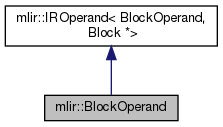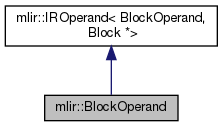Terminator operations can have Block operands to represent successors. More...
#include <UseDefLists.h>
Inheritance diagram for mlir::BlockOperand:

Collaboration diagram for mlir::BlockOperand:

Public Member Functions | |
| unsigned | getOperandNumber () |
| Return which operand this is in the operand list of the User. More... | |
 Public Member Functions inherited from mlir::IROperand< BlockOperand, Block *> Public Member Functions inherited from mlir::IROperand< BlockOperand, Block *> | |
| IROperand (Operation *owner) | |
| IROperand (Operation *owner, ValueType value) | |
| IROperand (IROperand &&other) | |
| ValueType | get () const |
| Return the current value being used by this operand. More... | |
| void | set (ValueType newValue) |
| Set the current value being used by this operand. More... | |
| Operation * | getOwner () |
| Return the owner of this operand. More... | |
| Operation * | getOwner () const |
| void | drop () |
| Remove this use of the operand. More... | |
| ~IROperand () | |
| BlockOperand * | getNextOperandUsingThisValue () |
| IROperand & | operator= (IROperand &&other) |
Static Public Member Functions | |
| static IRObjectWithUseList< BlockOperand > * | getUseList (Block *value) |
| Provide the use list that is attached to the given block. More... | |
Additional Inherited Members | |
 Public Types inherited from mlir::IROperand< BlockOperand, Block *> Public Types inherited from mlir::IROperand< BlockOperand, Block *> | |
| using | ValueType = Block * |
Detailed Description
Terminator operations can have Block operands to represent successors.
Member Function Documentation
◆ getOperandNumber()
| unsigned BlockOperand::getOperandNumber | ( | ) |
Return which operand this is in the operand list of the User.
Return which operand this is in the operand list.
◆ getUseList()
|
static |
Provide the use list that is attached to the given block.
The documentation for this class was generated from the following files:
- include/mlir/IR/UseDefLists.h
- lib/IR/Value.cpp
 1.8.13
1.8.13